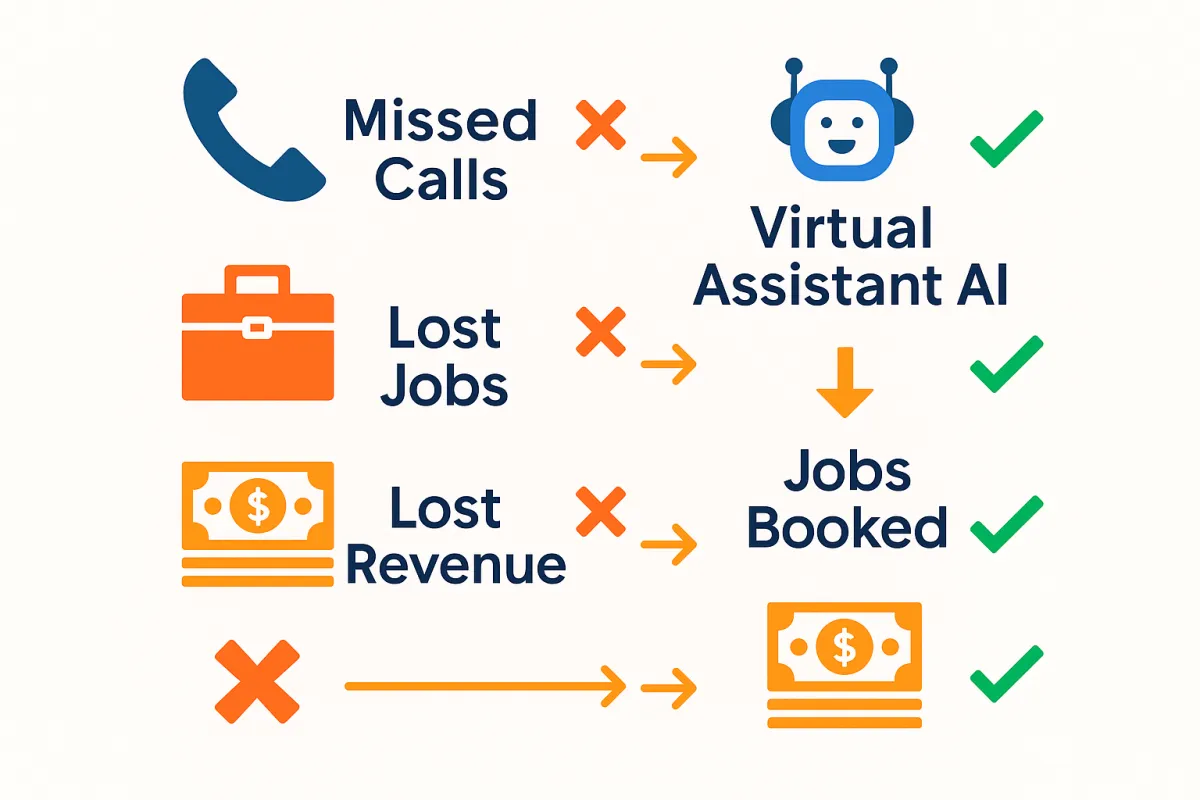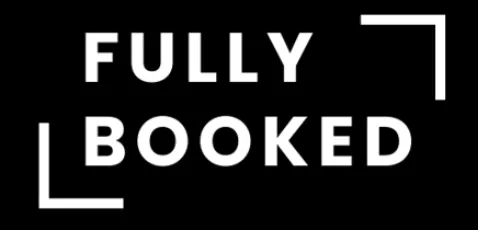
Virtual Assistant AI vs Human Assistant: Costs for Aussie Tradies
For Australian tradies, hiring a full-time receptionist can cost $55,000+ per year, while a custom build for a virtual assistant AI costs around $2,500 setup and $500 per month. The AI option often pays for itself within the first booked job each month, making it a cost-efficient and scalable solution compared to human admin support.
Introduction: Why This Comparison Matters
Tradies across Australia face a daily challenge: balancing hands-on work with constant phone calls, quotes, and scheduling. Every missed call risks losing a job. For years, the only fix was hiring a receptionist or outsourcing to an offshore admin. But both options bring high costs, training headaches, and limited coverage.
Today, virtual assistant AI offers a clear alternative. By answering calls, handling FAQs, and booking jobs in real time, it removes the need for a full-time hire. This post gives a head-to-head cost analysis of AI vs human assistants for tradies, with Australian wages and business realities in mind. The outcome is simple: tradies can make smarter, leaner decisions about where to invest.
The Real Cost of a Human Assistant
Hiring a receptionist in Australia is not just about the hourly wage.
Base salary and on-costs
The average receptionist salary sits between $55,000–$65,000 AUD per year (Fair Work Australia data). Add superannuation, annual leave, sick leave, payroll tax, and recruitment costs, and the true figure rises closer to $70,000 annually.Training and supervision
Every new hire needs time to get up to speed on quoting systems, job management platforms like ServiceM8 or Fergus, and customer expectations. Tradies often end up training receptionists themselves, costing hours that could be spent on billable work.Limited coverage
Most receptionists work 38 hours a week, within business hours. Calls outside 9–5 go unanswered, leaving a gap when potential clients are most likely free to ring. Many tradies report losing weekend and evening calls to competitors.Turnover risk
Admin staff churn is high. According to ABS data, average tenure in clerical and admin roles is under 3 years. Re-hiring and retraining cycles can double the cost burden.
When you add these elements, a single receptionist can easily cost $80,000+ in real terms per year, with no guarantee every call gets answered.
The Cost of Virtual Assistant AI
Virtual assistant AI takes a different approach. Instead of employing someone, tradies pay for a done-for-you system that answers every call, qualifies leads, and books jobs.
Setup fee
With Fully Booked, the typical setup is $2,500 AUD once-off. This covers custom scripting, integration with calendars or CRMs like ServiceM8, and training the AI on your business FAQs.Ongoing monthly cost
The system runs at $500 per month. This includes 24/7 call answering, SMS/email summaries, and unlimited handling of inbound enquiries.Scalability
Unlike a human receptionist, AI does not need breaks, holidays, or overtime rates. It handles 5 calls or 500 calls with no extra wage cost.ROI certainty
If one booked job per month equals $1,000 revenue (conservative for plumbing, electrical, or painting work), the system pays for itself almost instantly.
In practical terms, the yearly cost of AI is around $8,500, compared to $70,000–$80,000+ for a receptionist.
ROI Case Study: A Sydney Plumbing Business
Take a small plumbing business based in Sydney’s Northern Beaches. The owner receives around 12 calls a day. Historically, he misses 4 of those because he’s under a house or in a roof cavity.
Average missed job value: $450
Missed calls per week: 20
Lost revenue per month: $9,000
After installing virtual assistant AI:
Setup cost: $2,500
Monthly cost: $500
Recovered calls per month: Even if just 25% of lost calls convert, that’s $2,250 revenue recovered monthly.
Within the first 6 weeks, the AI pays back its setup fee. Over a year, the plumber secures an additional $27,000+ in jobs that previously slipped through.
Pros and Cons: Human Assistant vs Virtual Assistant AI
Human Assistant
Pros:
Warm, empathetic customer interaction
Can handle complex calls requiring negotiation
May double as office admin or invoicing support
Cons:
Expensive ($70,000+ annual cost)
Not available outside business hours
Risk of sick leave, resignation, or inconsistency
Requires constant training and supervision
Virtual Assistant AI
Pros:
Affordable ($2,500 setup + $500/month)
Answers every call, 24/7
Integrates with job management systems
Pays for itself with one job per month
No HR or payroll burden
Cons:
May need fallback routing for unusual calls
Some customers still prefer speaking with a person
Works best for trades with defined services and FAQs
Cost Analysis for Different Service Types
Plumbers and Electricians
For high-demand trades with average job values of $400–$1,000, virtual assistant AI produces strong ROI. Missing just one or two calls a week equates to thousands in lost revenue per month. With AI covering every call, the system not only prevents losses but can lift capacity without extra staff.
A human receptionist can still be useful for larger firms running crews of 10+ tradies, where admin complexity extends beyond phone calls. But for most owner-operators or small teams, the costs are unjustifiable.
Cleaning and Gardening Businesses
These businesses often operate on smaller job values ($200–$350 per booking). Here, the ROI equation looks different. A human receptionist at $70,000 per year is almost impossible to justify unless running a large-scale operation. AI, however, remains viable. With 40+ calls per week, even a modest recovery rate delivers enough extra jobs to make the $500/month fee worthwhile.
Our virtual assistant AI Australia: complete setup guide for tradies provides a further deep dive into how you can use this service for your own business.
FAQs: Virtual Assistant AI for Tradies
Q: Will my customers know they’re talking to AI?
No. Virtual assistant AI uses natural Australian voices and conversational scripts. Most customers cannot tell the difference but we always disclose they are speaking to AI up front.
Q: Can it integrate with my existing systems?
Yes. It connects with job management platforms like ServiceM8, Fergus, Tradify, and Buildxact. Calendar bookings can sync directly.
Q: What if the AI cannot answer a question?
Fallback routing sends the call to you or a nominated team member for complex cases. No call gets dropped.
Q: Is AI suitable for emergency callouts?
Yes. The system can recognise keywords like “urgent” or “burst pipe” and flag these as priority, ensuring immediate notification.
Key Facts Box
Human receptionist: $70,000–$80,000 annual cost, limited to business hours
Virtual assistant AI: $2,500 setup + $500/month ongoing ($8,500 annual)
Break-even point: 1 booked job per month for most trades
Coverage: 24/7 call answering, lead capture, job booking
Best suited for: Owner-operators and SMB tradies using ServiceM8, Fergus, or similar platforms
Why the Shift is Happening Now
Australian tradies are spending more than ever on Google Ads and SEO to bring in calls, but missed leads wipe out ROI. At the same time, hiring admin staff is becoming harder and more expensive. Virtual assistant AI fits the moment: a low-cost, outcome-focused tool designed for trades, not big corporates.
For those still weighing options, our detailed comparison of AI receptionist vs virtual receptionist: which is best for Australian tradies expands on the service differences.
Closing Summary + Call to Action
The numbers tell the story. Human assistants cost upwards of $70,000 per year and still miss calls after hours. Virtual assistant AI costs $8,500 annually, works around the clock, and can generate tens of thousands in recovered revenue.
For tradies, the decision is not about replacing people. It is about protecting revenue and scaling smart without unnecessary overhead.
If you want to see how this works in your business, book a demo through our AI receptionist Australia page. We’ll work with you to discover how many jobs you’re missing — and how quickly AI can cover them.

